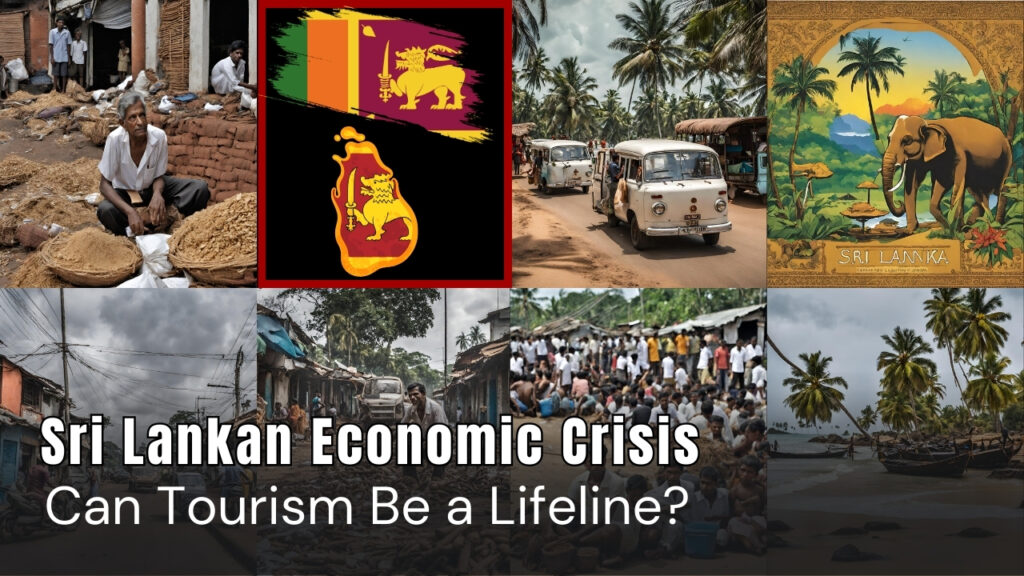100 words: The Sri Lankan Economic Crisis
Sri Lanka, once a tourism jewel, faces an economic crisis. Can tourism revive its fortunes? The answer lies in a shift towards responsible practices, showcasing cultural richness and natural beauty, and ensuring equitable benefits for communities. A lifeline it could be, but only if navigated wisely.
200 words: The Sri Lankan Economic Crisis
Sri Lanka, battered by debt and inflation, seeks a lifeline. Tourism, once a pillar of its economy, lies dormant. Can it be revived? Yes, but not with mass tourism’s unsustainable ways. Responsible practices, cultural immersion, ecotourism, these are the new paths. Adventure seekers, discerning travelers, they are the new clientele. High-value experiences, environmental protection, equitable benefits for communities, these are the guiding principles. Infrastructure, connectivity, government support, these are the tools. The journey is uphill, but the rewards – sustainable growth, shared prosperity, a vibrant island – are worth the climb.
300 words: The Sri Lankan Economic Crisis
Sri Lanka’s paradise beaches and ancient wonders are shrouded in economic gloom. Tourism, once a golden goose, is grounded. Can it take flight again? The answer lies beyond the beaches, in responsible practices. Cultural immersion, ecotourism, adventure – these are the new wings. High-value experiences, not mass crowds, are the fuel. Local communities, not just corporations, must share the sky. Infrastructure, government support, a commitment to sustainability – these are the runway lights. The path is not paved, but the destination is worth the journey – a resilient Sri Lanka, where tourism is not just a lifeline, but a catalyst for shared prosperity.
500 words: The Sri Lankan Economic Crisis
Sri Lanka’s sun-kissed shores and emerald hills are overshadowed by a financial storm. Tourism, once a buoyant raft in rough seas, now lies adrift. Can it be the lifeline that pulls the island nation back to shore? The answer is not a simple yes or no, but a complex dance of responsible practices, a strategic shift towards sustainability, and a commitment to equitable benefits for local communities.
The old model of mass tourism, with its focus on cheap deals and quick profits, has left scars on the landscape and the people. It is time for Sri Lanka to chart a new course, one where responsible practices are the compass, and cultural immersion, ecotourism, and adventure are the guiding stars. High-value experiences, not just numbers, are the currency of this new era. Discerning travelers, not just bargain hunters, are the clientele. Protecting the environment, not exploiting it, is the ethical imperative.
This shift is not just a matter of ideals, but of economic necessity. Global trends point towards a growing demand for authentic, sustainable travel experiences. Sri Lanka, with its unique cultural tapestry and diverse landscapes, is perfectly positioned to tap into this market. But it needs to invest in infrastructure, streamline visa processes, and create a seamless travel experience that showcases its hidden gems beyond the beaches.
The government has a crucial role to play in this transformation. Streamlining regulations, incentivizing responsible practices, and partnering with local communities are essential steps. It needs to ensure that tourism is not just a top-down solution, but a bottom-up process that empowers communities and shares the benefits of this new wave.
The challenges are not to be underestimated. Global economic uncertainties, rising travel costs, and the lingering pandemic can dampen tourist arrivals in the short term. But Sri Lanka has the resilience, the resources, and the potential to overcome these hurdles. By embracing responsible tourism as a cornerstone of its development strategy, the island nation can chart a course towards a future where tourism is not just a lifeline, but a catalyst for sustainable growth and shared prosperity.
This path ahead may be steep, but the rewards are immense. A thriving tourism industry, built on responsible principles, can enrich not just the economy, but the soul of Sri Lanka itself. The island nation can once again become a beacon of hope, a testament to the power of responsible travel, and a destination where cultural richness, natural beauty, and economic prosperity coexist in harmony.
Also Read:
Amazing Essay on T20 Cricket World Cup | 100 upto 1000 Words for All Grades Students



